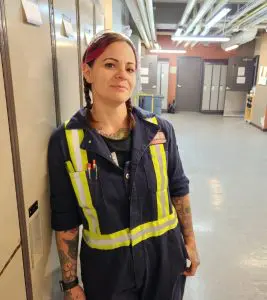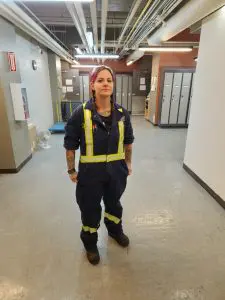Lizette
Lizette wanted to get into the trades to support her family. Now, she’s advocating for more neurodiverse individuals in the skilled trades.

“I think that representation is very important. When you see somebody that maybe has similar challenges to what you do or can relate to them, and they’re actively trying to break these barriers, it can give hope to others.”
Meet Lizette
When Lizette first considered a career in the skilled trades, she juggled the responsibilities of driving a school bus, caring for two toddlers and navigating a divorce. Determined to support her children and build a career for herself, Lizette felt that the skilled trades might be her path forward.
“I was like, if I can drive a bus, I can learn how to fix a bus,” recalls Lizette.
Today, Lizette is a Red Seal journeyman automotive service technician and a third-year heavy equipment technician. Her apprenticeship journey began with no prior experience, and she faced challenges finding a job in the industry. This led her to Women Building Futures (WBF), where she signed up for the Journeywoman Start (now Journey to Trades) program and graduated in 2014. The program equipped her with the skills, confidence, knowledge and connections she needed to launch her career.
Getting ready for the trades
WBF’s training programs and wraparound services are designed to remove barriers and support women to take the next step in their careers—and their lives. At WBF, women are surrounded with the support they need to succeed, from when they first reach out and throughout their careers.
“Even though the training classes did not apply directly to mechanics, there was so much takeaway from them. With the hands-on skills experience, I was able to get my first job in a shop right out of my program,” says Lizette.
Lizette’s first job was at a truck and trailer shop, and she later moved to a school bus company, a role she had always wanted. She completed her apprenticeship at various shops, honing her skills and eventually leading a shop. Transitioning from buses to larger trucks, Lizette now works in a heavy-duty shop, learning to repair firetrucks.
“It’s pretty exciting,” beams Lizette.
This year, Lizette aims to complete her heavy equipment technician ticket. “I’ve always wanted to have two tickets to keep my windows of opportunity open,” she says.
Entering the trades wasn’t without its challenges. “The industry is definitely challenging when you are very green [with no experience]. You have to be really committed to learning, asking questions, putting yourself out there and willing to do any tasks until you know things. You must prove yourself and show that you want to be there and learn. Over the years, I had to do a lot of learning,” says Lizette.
The Journey to Trades program set Lizette up for success. “I learned so many things that I could apply to my journey. Having those basic welding skills was really important. Every now and then, I still do welding for basic fabrication. I found having electrical diagnostic skills in my trade is invaluable, so I’ve focused on that a lot and honed those skills. The skills I learned have helped me a lot on this journey,” says Lizette.
Breaking barriers
Having grown professionally in the industry over the last 10 years, Lizette’s trades journey does not come without its own set of barriers.
“I’ve run into some challenges with my disabilities, especially how they affect me in the workplace. My autism and ADHD can affect my ability to do my job efficiently and properly, but at the same, they can also greatly influence it and make me really good at my job,” says Lizette. Learning how to manage and adapt and understanding what kind of supports she needs in the workplace has helped Lizette be successful at what she does.
Lizette advocates for more neurodiverse individuals in the skilled trades, recognizing that many see neurodivergence as a barrier. “I think that representation is very important. When you see somebody that maybe has similar challenges to what you do or can relate to them, and they’re actively trying to break these barriers, it can give hope to others,” she says.
Inspiring the next generation: A legacy of empowerment
Her role modelling has inspired others to explore opportunities in the trades, and one particular family member makes Lizette swell with pride—her 15-year-old daughter, who is also following in her footsteps. “My daughter is like me. She’s autistic and she’s a first-year automotive technician. She’s a RAP student and is still in high school. She works part-time and learning the trade.
“She’s found that she’s really good at this too and really likes the job. Being neurodiverse shouldn’t be a barrier to working with the right supports and knowing your strengths and weaknesses. We can work around and improve our weaknesses,” says Lizette. “I’m so proud of my daughter, and I’m proud of how far she’s come and all the skills she learned,”
Lizette’s apprenticeship journey in the skilled trades is a testament to her resilience, determination and passion. From juggling multiple responsibilities to becoming a role model for her daughter and others in the industry, Lizette has shown that anything is possible with the right support and mindset.


